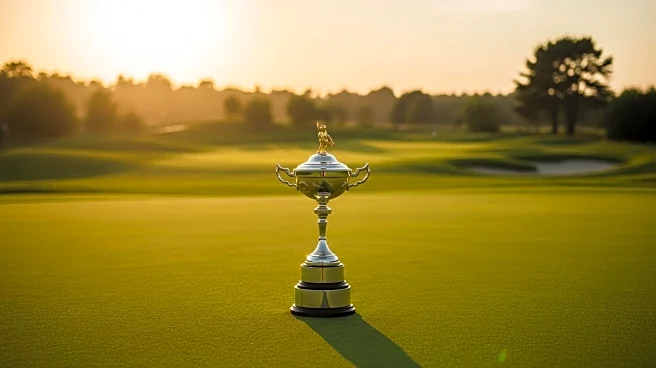What is the story about?
What's Happening?
The Ryder Cup, a biennial golf tournament, is gaining attention as it approaches its September event. The competition pits 12 top golfers from the United States against 12 from Europe, fostering national pride and team spirit in a sport typically dominated by individual play. ESPN's Keith Jenkins discusses the tournament's unique format and its impact on golf's popularity, noting the involvement of prominent players like Scottie Scheffler and Rory McIlroy. The Ryder Cup is seen as a cultural event that brings drama and excitement, reminiscent of the Tiger Woods era when golf was a major pop culture phenomenon.
Why It's Important?
The Ryder Cup's resurgence highlights a renewed interest in golf, a sport that has struggled to maintain its popularity since the peak of Tiger Woods' career. This event offers a platform for showcasing top talent and engaging new audiences, potentially revitalizing the sport's cultural relevance. The team-based format contrasts with traditional individual competitions, adding a layer of national pride and camaraderie. As golf seeks to capture the attention of younger audiences with shorter attention spans, events like the Ryder Cup play a crucial role in sustaining interest and expanding the sport's fan base.
What's Next?
As the European team finalizes its roster, strategic decisions by captain Luke Donald will shape the competition. The selection process involves balancing skills such as driving and putting, as well as team chemistry. The Ryder Cup will take place at the end of September, offering a spectacle of competitive golf and national pride. The event's outcome could influence future interest in golf, potentially leading to increased participation and viewership. Stakeholders in the golf industry will be watching closely to assess the impact on the sport's popularity and market dynamics.
Beyond the Headlines
The Ryder Cup's emphasis on team competition introduces ethical considerations regarding national representation and sportsmanship. The event challenges the traditional individualistic nature of golf, promoting collaboration and unity. This shift may influence how golf is perceived culturally, encouraging a broader appreciation for teamwork and collective achievement. Additionally, the Ryder Cup's role in golf's resurgence could lead to long-term shifts in how the sport is marketed and consumed, with implications for media coverage and sponsorship opportunities.















